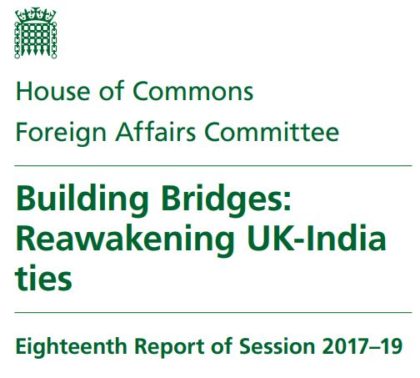UKIBC supports Foreign Affairs Committee Report on Re-Awakening UK-India Ties
Drawing on evidence submitted by the UK India Business Council, the House of Commons Foreign Affairs Committee (FAC) this week published their report ‘Building Bridges: Reawakening UK-India Ties’.

Though the UK is well placed to capitalise on a mutually beneficial relationship with India, the report makes the case for the UK to do more to adjust its Global Britain strategy to India’s enhanced influence and global power.
The UK India Business Council agree with the FAC findings that a full Free Trade Agreement should remain a long-term objective and we would encourage both Governments to become ever closer strategic partners on the world stage. Much still remains to be done to make this possible, but with India taking its rotating seat on the UN Security Council and hosting the G20 Heads of Government meeting in 2022, there are clearly opportunities for closer bilateral ties on a range of economic and political issues.
Both the Foreign Affairs Committee and UKIBC agree that recent improvements to India’s business environment have been impressive and stand to drive stronger bilateral ties. Much remains to be done, however, as changes at the policy level have not yet permeated to the operational level.
The Government of India recognises this and has just announced the extension of its Ease of Doing Business mapping operations to the district level where businesses face day-to-day challenges. The UKIBC welcomes this move as it signals that improving the business environment yet further will be high on the new Government’s agenda.
There are also significant market access barriers that currently limit trade between the UK and India. Some of these are being considered by both Governments through the Joint Trade Review (JTR) and the Joint Economic and Trade Committee (JETCO) processes which, if successful, will ultimately lay the groundwork for a Free Trade Agreement.
In doing so, the UK will succeed if it is responsive to India’s priorities and communicates its own objectives and proposition and commitment to India clearly.
As both the report, our evidence to the FAC, and our oral evidence to the APPG on International Students highlight, limits on the movement of people, particularly skilled temporary workers and students, are a major constraint to UK-India ties.
Although 60% of all UK Tier 2 visas are awarded to Indian nationals, with nine in every ten visa applications from India granted, the FAC reported that “skilled workers, students, and tourists find the (UK Visa) system unwelcoming, expensive, and difficult to navigate”
These road-blocks limit key sectors for UK-India trade and investment such as education, defence, advanced manufacturing, and future technology. Likewise, in 2018 over 750,000 Indian students studied abroad, however fewer than 20,000 were in the UK—two-thirds the number in New Zealand.
We very much welcome, as a step in the right direction, the UK Government’s recent proposal to extend from four to six months the period in which recent graduates can search for work in the UK and the setting of a target to increase international student numbers. However, we do not think this goes far enough.
As such, the FAC’s report this week supports UKIBC’s recommendation that the Government should commit to re-instigating the post-study visa period to two years. Such a move would directly challenge negative perceptions of the UK’s openness to Indians and grow UK education exports.
This is the case UKIBC is making through the UK-India CEO Forum and further dialogue with the Home Office on the Government’s recently published immigration White Paper on behalf of our Indian business and UK Higher Education members.
Today’s FAC report also rightly highlights that the UK stands at risk of falling behind other countries in its strategic defence manufacturing partnerships.
India is currently undertaking immense efforts to modernise its armed forces and is currently the world’s second biggest importer of major arms. Whilst France, Israel, and the US have all increased their defence trade with India at a time when India is actively seeking to diversify its international suppliers, the FAC has reported that UK trade has ‘flatlined’ in this respect.
India’s defence modernisation programme presents an opportunity to not simply boost trade, but actively build a closer strategic relationship. This is why UKIBC has established a defence sector advocacy group which has recently met with senior Officials from India’s Ministry of Defence and is due to meet in Delhi later this week.
Likewise, we look forward to hosting UK Advanced Manufacturing companies in a roundtable with Invest India later this week as we launch our own report on addressing market-access barriers in the sector.
Whether in defence, healthcare, manufacturing, education, or the digital sectors, the UKIBC agrees that the UK and India stand to benefit from further trade, investment, and expertise from each other on a mutual and reciprocal basis. However, whist businesses and higher education institutions are the key drivers of this relationship, the report published by the FAC rightly highlights that greater efforts need to be taken.
Indeed, our dedicated UKIBC Sector Advocacy Groups serve to act on this, bringing leading businesses and institutions in each of these sectors together to identify the key market access barriers and advocate the high-impact reform that can deliver investment.
The ‘Global Britain’ strategy is therefore an opportunity ‘re-awaken’ our ties, though this cannot be taken for granted and businesses need to be at the heart of the next stage of Government to Government relations between the UK and India if it is to prove effective.
You can read the UK India Business Council’s full written evidence to the House of Commons Foreign Affairs Select Committee’s Global Britain and India Inquiry here.






